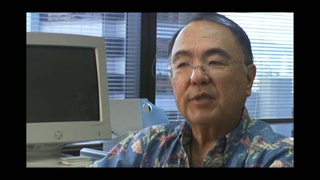Interviews
Okinawan discrimination
Like Okinawan people, those days they were sadly discriminated. I remember that they lived in special area. And they were such nice people. And my mother told me I shouldn’t discriminate them. And so I became good friends with couple of Okinawa-ken girls. And at school, the other students, the Naichi girls—you know what the Naichi is, the Naichi people who came from mainland Japan. You know the Hiroshima, Yamaguchi or the non-Okinawans whose parents came from the main island of Japan—they were called Naichi. And so, because I played with the Okinawan people—they pulled their hair and they wouldn’t play together—every recess, the Okinawan girls were all alone. But, because my mother had taught me—and I like those girls, they were so nice—I really got along well with them. So, I used to play together with them. So they would pull my hair to punish me.
But, discrimination was terrible in those days. And when I interviewed the Okinawan picture brides, they told me how much they had suffered because some people were so cruel to them.
Date: February 19, 2004
Location: Hawai'i, US
Interviewer: Lisa Itagaki, Krissy Kim
Contributed by: Watase Media Arts Center, Japanese American National Museum.
Explore More Videos

Difficulty getting work during World War II
(b. 1921) Nisei businessman. Established "Made in Oregon" retail stores

Discharged from the U.S. Army after Pearl Harbor
(b. 1918) Founder Azumano Travel


Stereotypes about Japanese: past and present (Spanish)
(b. 1937) Professional journalist

World War II hysteria against Japanese in New York City
(1924-2018) Researcher, Activist




Positive experiences with Asian Americans for Action
(1924-2018) Researcher, Activist

Being an American soldier and an "enemy alien"
(1923-2011) Lawyer, MIS veteran, founder of Francis and Sarah Sogi Foundation

Not relating to Japan Americans' experiences on the mainland
(1923-2011) Lawyer, MIS veteran, founder of Francis and Sarah Sogi Foundation


Living conditions in prison while serving time for resisting the draft
(b. 1925) Draft resister

Talking to children about decision to resist the draft during World War II
(b. 1925) Draft resister

Reflecting on Japanese Americans' response to incarceration
(b. 1925) Draft resister
